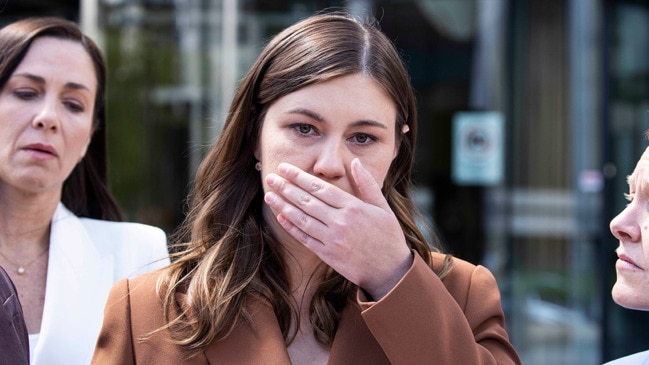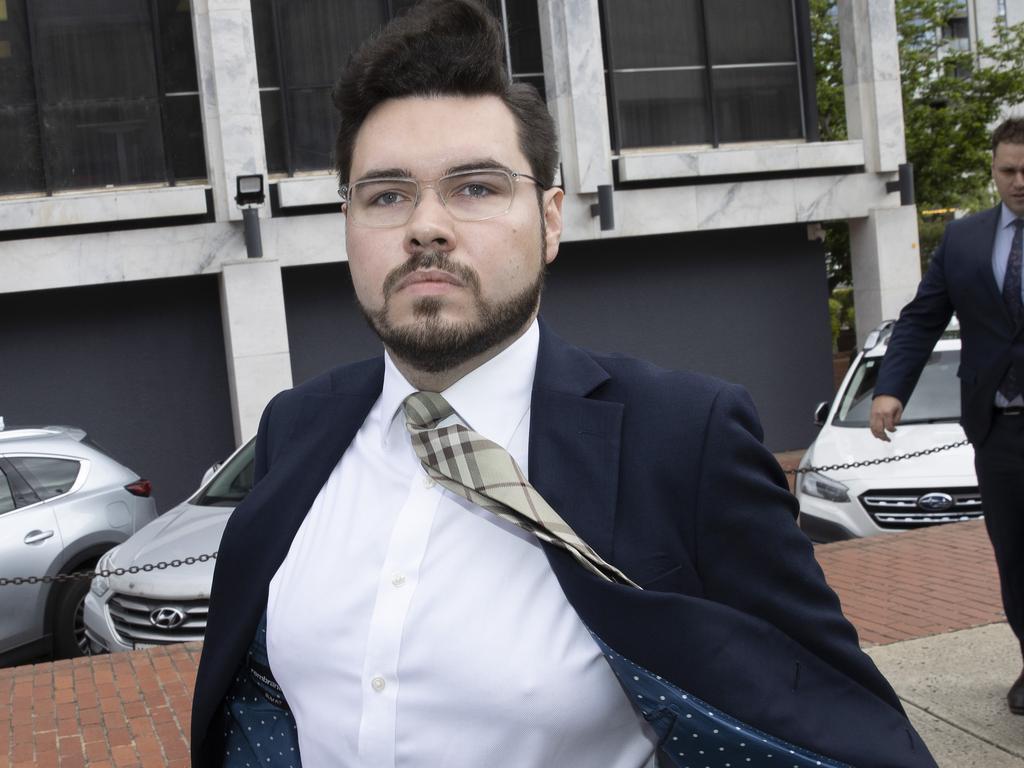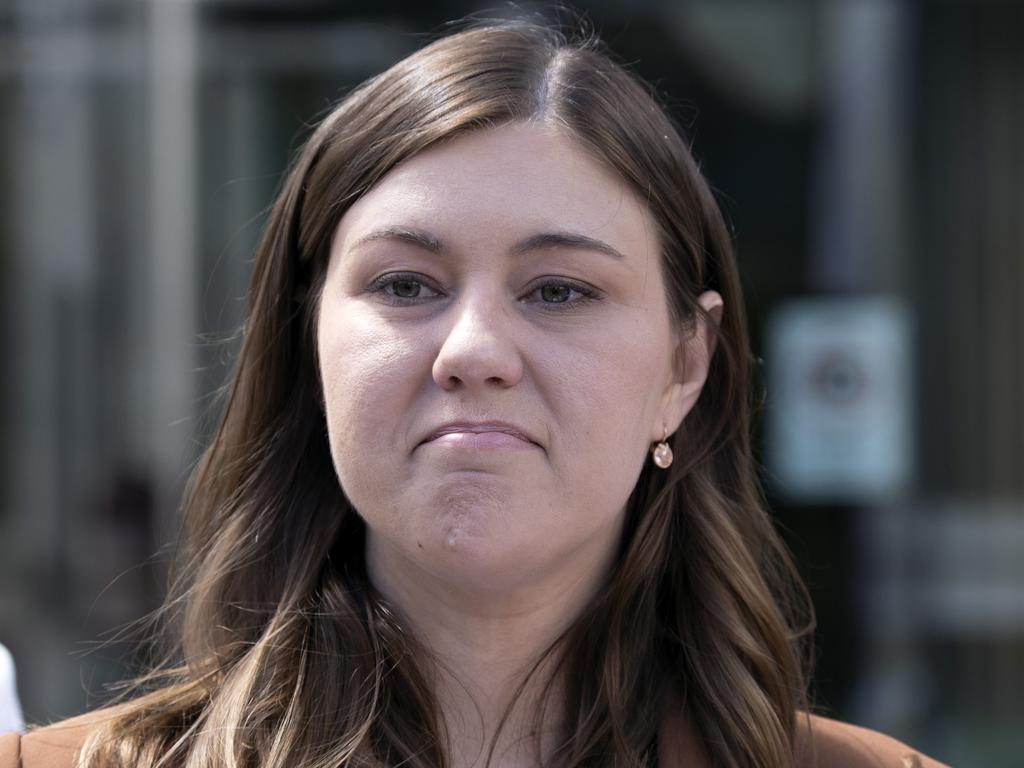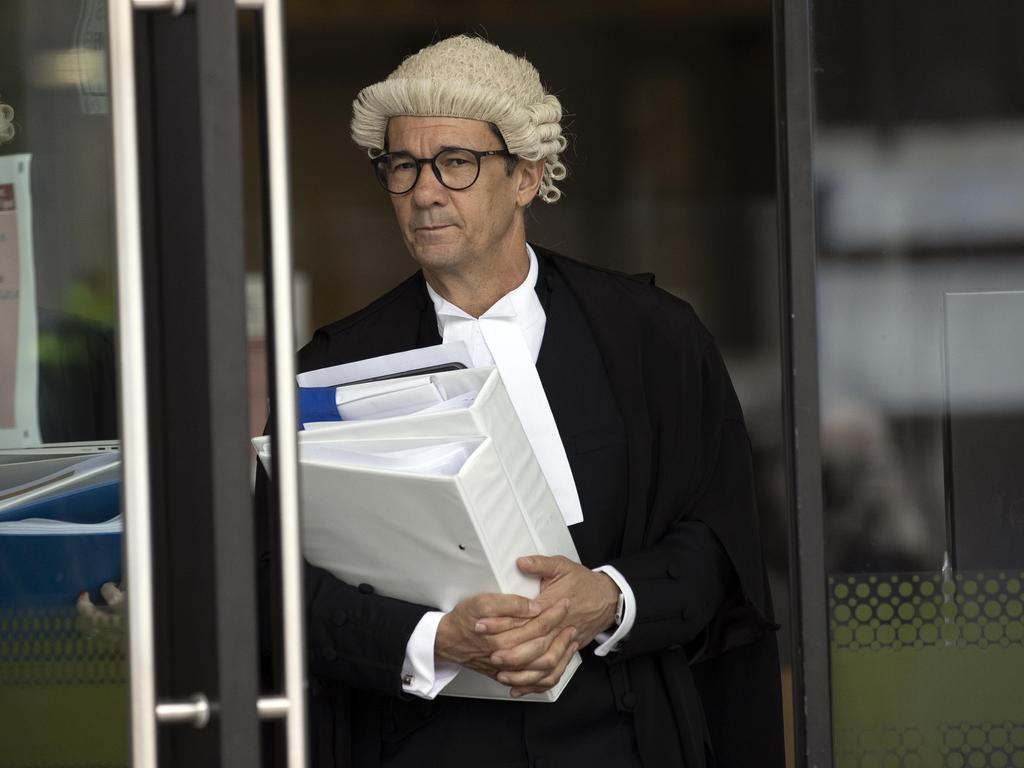Charge against Bruce Lehrmann dropped after Brittany Higgins rape allegations
In a major development, the charge against Bruce Lehrmann, the man accused of sexually assaulting Brittany Higgins, has officially been dropped by the prosecution.

New evidence that the “ongoing trauma” associated with the prosecution of Bruce Lehrmann poses an unacceptable risk to the life of the complainant Brittany Higgins has prompted prosecutors to drop the rape charge and not proceed with a second trial.
ACT director of public prosecutions Shane Drumgold confirmed today he had reviewed new medical evidence.
“I have recently received compelling evidence from two independent medical experts, that the ongoing trauma associated with this prosecution presents an unacceptable and significant risk to the life of the complainant,’’ he said.
“The evidence makes it clear this is not limited to the harm of giving evidence in the witness box, rather applies whether or not the complainant is required to re-enter the witness box in the re-trial.
“Whilst the pursuit of justice is essential for my office and the community, the safety of a complainant in a sexual assault matter, must be paramount.
“In light of the compelling independent medical opinions, and balancing all factors, I have made the difficult decision that it is no longer in the public interest to pursue a prosecution at the risk of the complainant’s life.”
His statement came as Ms Higgins’ close friend and supporter Emma Webster revealed the former Liberal staffer was in a Queensland hospital undergoing mental health treatment.
Want to stream your news? Flash lets you stream 25+ news channels in 1 place. New to Flash? Try 1 month free. Offer available for a limited time only >

Mr Drumgold said he had “no other options but to file a notice declining to proceed with the retrial of prosecution, which I have done this morning.”
“This brings this prosecution to an end.
“Before concluding, during the investigation and trial, as a sexual assault complainant Miss Higgins has faced a level of personal attack that I have not seen in over 20 years of doing this work. She has done so with bravery, grace and dignity, and it is my hope that this now stop that Miss Higgins now be allowed to heal.”
Mr Drumgold read from a prepared statement during the press conference and did not take questions.
He noted that the DPP policy states that “the decision to prosecute should not be made lightly nor automatically but only after due consideration.”
It notes that the decision to prosecute can be understood as a two-stage process.
“First, does the evidence offer reasonable prospects of conviction?
“If so, is it in the public interest to proceed with a prosecution?

Mr Lehrmann, who was charged with one count of sexual intercourse without consent August, 2021, pleaded not guilty to the charge.
The second trial was listed to commence on February 20, 2023. It followed the first trial being aborted as a result of jury misconduct.
His lawyers told the court that no sexual activity took place and have criticised the decision to prosecute him.
Brittany Higgins’ taped interview from first trial
In November, it was revealed that the ACT Director of Public Prosecutions was seeking “urgent” legal changes in the ACT that could have ensured that the evidence Brittany Higgins gave in court can be played to a jury in a retrial allowing her to avoid taking the witness stand a second time.
While a tape of Ms Higgins’ cross examination in the first trial was available, there was question mark over if it could be used under current legislation.
The proposed changes centre on what happens if a sexual assault complainant gives evidence in open court – as Ms Higgins did – and not through a remote video link that can be recorded and played to the jury at a retrial.
It would allow that evidence to be played to the jury in the same way it would be if the evidence was recorded from a remote location, ensuring that the complainant is not forced to give evidence a second time.

Jury misconduct ended the first trial
A 12-person Supreme Court jury was discharged by the Chief Justice Lucy McCallum on October 27 after allegations of juror misconduct.
The jury never reached a verdict over whether the accused former Liberal staffer was guilty or not guilty of one count of sexual intercourse without consent, and being reckless to her consent, based on the evidence presented during the near three-week trial.
In a footnote to a written judgment released by the Chief Justice of the ACT Supreme Court Lucy McCallum, it was subsequently revealed that after the juror was discharged that court sheriffs found two additional documents that should not have been in the jury room.
The juror was questioned by the Chief Justice in closed court on Thursday with the media excluded, to ensure there was no breach of laws that prohibit the identity of the juror.
The Chief Justice told the ACT Supreme Court that it was an “inadvertent” discovery by sheriff officers of the court.

“The subject matter of the paper is indeed sexual assault,’’ she said.
“Specifically, it is a discussion of the unhelpfulness of attempting to quantify the prevalence of false complaints of sexual assault and a deeper, research-based analysis of the reasons for both false complaints and scepticism in the face of true complaints.”
“The unfairness to both parties is manifest”
During the course of the trial, the Chief Justice said on her calculation, the jury must have been given at least 17, and possibly more, warnings or directions as to the prohibition on undertaking any research or inquiries of their own.
“In my opening remarks to the jury, I said: ‘Sometimes it happens in jury trials that jurors become curious about a matter. They might think that they might learn more if they went to visit the place where something is alleged to have happened, or consider – sometimes jurors have been reported to have tried to re-enact various things to see if something could happen the way someone said.
“And you will appreciate from what I have said to you that that is absolutely forbidden, members of the jury.
“The discovery of the article and the fact that it was brought into the jury room, of itself, necessitated the discharge of the whole jury.”




